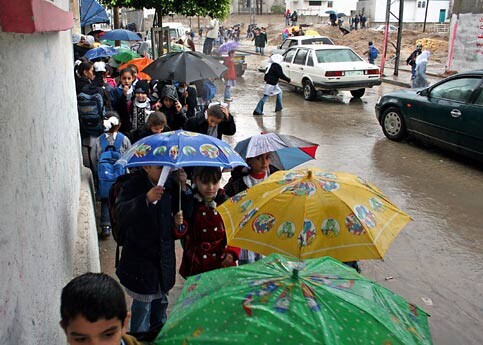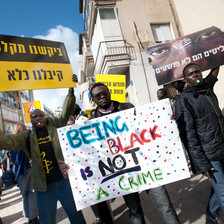Dheisheh refugee camp, Palestine 21 January 2007

Flooded streets in Gaza following a rainstorm, 21 December 2005. (MaanImages/Wesam Saleh)
It is the dead of winter here in Palestine. Slick rivers of mud and sewage drain into the gutters as hot tea is served in small glass cups, over and over again, to ward off the biting cold. People sit huddled near the gas heaters, rain pounding against the windows and steel doors as they brace for the next storm — not just the one coming down in a torrent from above, but the one just five miles up the road, past the illegal checkpoints, where Israel is planning the next step in its project of ethnic expulsion and sanitization.
Six months after my last trip here, and I am once again in a permanent state of shock and fury. Time after time, I am left speechless by the growing cancerous tentacles of the settlement blocs; by the headlines that describe the most horrible killings by the occupation military; and by the general resilience of the people who, against all odds, are still able to wake up in the morning and face another day under this occupation conducted in a language of relentlessly racist illogic and absurdity.
Daily life for the average Palestinian is certainly getting worse. Over the last year, after Hamas won the leadership in one of the most free and fair democratic elections that the Middle East has ever witnessed, the US, the EU and Israel slashed and burned the Palestinian economy in a grand, sweeping collective punishment that will take years, if not decades, to recover from. Here in the Bethlehem area, medical workers, postal employees, teachers, social service administrators and shop owners have been punched in the gut from the trickle-down effect of a suffocated financial crisis.
Yes, there has been some lightening of loads in various areas. Currently, Israeli Prime Minister Ehud Olmert exacted a token gesture to lessen the restrictions on a select few checkpoints (over 400 exist, in contravention to international law, but I digress), so it is now a little easier for Palestinians to travel to and from certain cities. And a fraction of the 10,000 Palestinian political prisoners will be released, apparently, from Israeli detention facilities — places where thousands of people have wasted years of their lives under torturous and outrageous conditions, most of whom have never been charged, and have never seen the inside of a courtroom where they may plead their case in front of a jury of their peers. These concessions are welcomed, of course, in order to ease the daily life for many people and their families. But it is not cause for celebration. Overall, the situation in the West Bank is getting progressively worse and more repressive.
These news headlines, as many people fear, are something calculated by Israel and its American counterparts to distract and placate Palestinians from what is coming. I met with the tireless journalist and frequent contributor to EI, Jonathan Cook, near his home in Nazareth a few days ago. He told me in an interview that something sinister was afoot in the context of Condoleezza Rice and Mahmoud Abbas’ growing friendship; that the renewed discussions of a “Palestinian state” will eventually culminate in a final solution for Palestine and its millions of people.
Cook described this future “state” akin to an enormous, ghettoized reservation arrangement — the islands of Palestinian areas in the West Bank that are fractured by the Israeli settlements, along with the miserable, weighted island of Gaza, will be declared “Palestine” and will immediately be acknowledged as an “enemy state” like Syria and Iran and Lebanon.
Palestinians living today inside Israel will be particularly shoved against the literal and metaphoric wall. Talks of so-called “loyalty schemes” are becoming popular within the marble hallways of the Knesset — contracts that Palestinian citizens of Israel will be made to sign declaring their loyalty to the Jewish and democratic state. If they are caught inside the occupied territories, or acting to change the political system, they will simply be stripped of their citizenship, and probably deported down the street to “Palestine.”
There could very well be a Mogadishu next to Jerusalem; a sham state that will be the death of future talks of refugees’ rights of return, of the settlement dismantling, of a unified, bi-national state for all that live in this sad strip of land next to the azure Mediterranean. This is a quite outrageous yet realistic vision, and time is running out before all the details are drawn up and plans are formalized, before the suits in Jerusalem and Washington DC shake hands and wipe them clean of the Palestine problem.
People are, meanwhile, buying time. Someone asked me today if I had spoken with anybody who held any hope. I couldn’t think of one person during my travels up and down the region. In Gaza, a colleague there said that people have begun to run out of cooking gas and cigarettes, that people stay in bed out of hunger, cold and searing depression. For the three and a half million Palestinians living in the ghetto prison of the West Bank, they can see that the escalating squalor-nightmare of Gaza is on its way here, tumbling over the wet hillsides like a silent, aching storm.
Nora Barrows-Friedman is the producer and co-host of Flashpoints, a daily investigative newsmagazine on the Pacifica Radio Network in the States. Twice a year, she travels to Palestine to document the situation there from the ground and lead media training courses for children at the Ibdaa Cultural Center in Dheisheh Refugee Camp. Visit her website at www.norabf.com.





